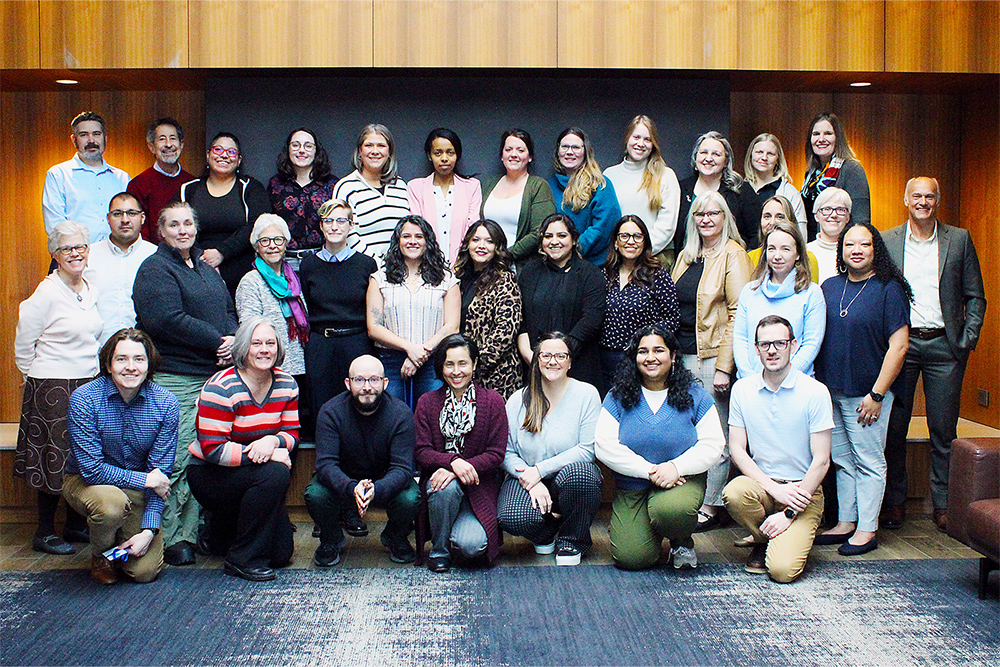Developed by the Northwest Center for Public Health Practice and the Northwest Regional Primary Care Association, the Leadership Institute brings together emerging leaders in public health and primary care to develop more equitable and effective approaches to population health.
This program, which centers health equity as a shared goal of both sectors, provides a unique opportunity to expand your skillset and leadership development as you work with peers on new models of care to drive sustainable improvement in the health of individuals, communities, and populations.
Quick Facts
Focus: Intersections of primary care and public health centered on health equity
Schedule: March–September 2025. Two planned in-person sessions (March 12–14 and September 17–19) in Seattle and 2-hour, virtual sessions on the third Wednesday of the month between April through August. See a sample schedule for an in-person session.
Format: In-person and distance-based learning, small groups
Who should apply: Mid-career professionals from public health and community-based primary care settings, people of color and other underrepresented groups, and professionals working in rural areas and/or with medically underserved populations are strongly encouraged to apply.
Application deadlines: The application period for the 2025 cohort closed October 14, 2024.
Cost: $3,800 early bird (applications received by August 31, 2024) / $4,070 regular tuition (applications received after earlybird and by October 14, 2024). Tuition covers faculty, staff, facilities, program resources, access to distance learning technologies, and breakfast & lunch during in-person sessions. They do not cover travel or lodging expenses to and from the in-person sessions. Limited scholarship funds may be available, see the application for more details.
Questions: For questions about the program, contact Barbara Rose at the Northwest Center for Public Health Practice or Seth Doyle at the Northwest Regional Primary Care Association.
Intended Audience
We welcome a diverse group of emerging leaders from a variety of public health and primary care fields. Participants represent, but are not limited to, a range of organizations, including state and local health departments, community health centers, tribal health departments, community-based organizations, hospitals, Washington’s Accountable Communities of Health or Oregon’s Coordinated Care Organizations, behavioral health organizations, and the Washington State Health Care Authority.
Learning Competencies and Formats
Centering health equity to promote healthy communities, the Northwest Public Health and Primary Care Leadership Institute creates cross-sector communities of practice and develops participant competencies in the following areas:
- Population Health and Health Equity
- Systems Thinking
- Leadership and Change Management
- Healthcare Transformation and System Integration
The curriculum, taught by practice-based faculty and guest speakers from around the region and nation, uses a variety of methods to build leadership competencies for addressing today’s most challenging public health and primary care issues, especially around collaboration. Scholars participate in group and individual assignments, panels, lectures, webinars, and discussions, and use problem-based learning to explore real-life situations leaders face in the field. They also work on a project specific to their work or organization, guided by faculty mentors with executive experience. An individual leadership plan serves as a roadmap for their personal leadership development.
What is problem-based learning?
Problem-based learning (PBL) is an instructional approach that simulates real-world problems to drive the learning process. Program faculty and staff write cases and support small learning groups of scholars who examine the cases, identify key issues, research solutions, and apply findings to each case. This approach allows scholars to work with the complexities of real-world public health challenges. It also encourages both self-directed learners and team players.
Cases help scholars acquire situational knowledge, which is critical for effectively retrieving and applying information. This is especially important in a leadership context because situational knowledge is more tangible and detail-oriented, as opposed to content knowledge, which is more abstract and principle-oriented. Watch a brief video about problem-based learning.
What’s the difference between the Leadership Institute and NWCPHP’s Public Health Management Certificate?
The Leadership Institute focuses on skills designed to lead organizations through change or move organizations in a new direction. Some of these skills include understanding and using data effectively, leading teams of diverse and competent staff and partners, and adaptive leadership. The Public Health Management Certificate focuses on skills that provide structure and consistency within an organization. Some of these skills include budgeting, planning, staffing, conflict negotiation, and interpersonal understanding. Both sets of skills are needed for a successful organization.
Faculty and Staff
The Leadership Institute works with program faculty, staff, and regional & national guest speakers.
Antoinette Angulo, MPH
Program Director
Bio and contact >
Barbara Rose
Program Manager
Bio and contact >
Gary Goldbaum, MD, MPH
Faculty Mentor
Bio and contact >
Jennifer Jones-Vanderleest, MD, MSPH
Faculty Facilitator
Bio and contact >
Carolina Lucero, MSW
Faculty Mentor
Bio and contact >
Nicole Sadow-Hasenberg, MPH
Faculty Facilitator
Bio and contact >
Christine Mosbaugh
Faculty Facilitator
Bio and contact >
Kevin deVoss, MA
Instructional Support
Bio and contact >
Presented in collaboration by:

